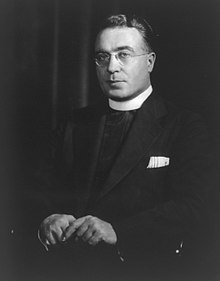Father Charles Coughlin
|
Monsignor Charles Edward Coughlin |
|
|---|---|

Coughlin c. 1933
|
|
| Church | Roman Catholic |
| Orders | |
| Ordination | 1916 |
| Personal details | |
| Birth name | Charles Edward Coughlin |
| Born |
October 25, 1891 Hamilton, Ontario, Canada |
| Died | October 27, 1979 (aged 88) Bloomfield Hills, Michigan, United States |
| Buried | Holy Sepulchre Cemetery, Southfield, Michigan |
| Parents | Thomas J. Coughlin and Amelia Mahoney |
|
|
Charles Edward Coughlin (/ˈkɒɡlɪn/ KOG-lin; October 25, 1891 – October 27, 1979), was a controversial Canadian-American Roman Catholic priest based in the United States near Detroit at Royal Oak, Michigan's National Shrine of the Little Flower church. Commonly known as Father Coughlin, he was one of the first political leaders to use radio to reach a mass audience, as up to thirty million listeners tuned to his weekly broadcasts during the 1930s. He was forced off the air in 1939.
Early in his radio career, Coughlin was a vocal supporter of Franklin D. Roosevelt and his New Deal. By 1934 he had become a harsh critic of Roosevelt, accusing him of being too friendly to bankers. In 1934 he established a new political organization called the National Union for Social Justice. He issued a platform calling for monetary reforms, the nationalization of major industries and railroads, and protection of the rights of labor. The membership ran into the millions, but it was not well-organized at the local level.
After hinting at attacks on Jewish bankers, Coughlin began to use his radio program to issue antisemitic commentary, and in the late 1930s to support some of the policies of Adolf Hitler, Benito Mussolini and Emperor Hirohito. The broadcasts have been called "a variation of the Fascist agenda applied to American culture". His chief topics were political and economic rather than religious, with his slogan being "Social Justice", initially in support of, and later opposing, the New Deal. Many American bishops as well as the Vatican wanted him silenced, but after the outbreak of World War II in Europe in 1939 it was the Roosevelt administration that finally forced the cancellation of his radio program and forbade the dissemination through the mail of his newspaper, Social Justice.
...
Wikipedia
